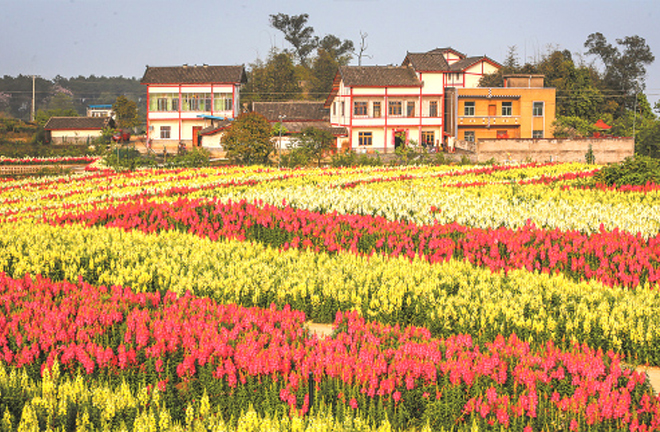Central government acts to improve rural quality of life

Houses are surrounded by flowers at the Huangguashan Village, Yongchuan District in Chongqing Municipality, which was recognized as a demonstration village for improving the rural residential environment nationwide in 2017.
On Feb. 5, the General Office of the CPC Central Committee and the General Office of the State Council issued the “Three-year Action Plan for the Improvement of Rural Human Settlements,” which set specific targets and requirements for the improvement of living conditions of rural residents.
Rural revitalization is a priority set in the 19th CPC National Congress. It is a major historical task for the construction of a moderately prosperous society and modern socialist country in all aspects. The action plan pointed out that improving rural human settlements and building beautiful, livable villages is an important part of rural rejuvenation. It is related to the fundamental well-being of farmers and concerns the harmony of rural society and civilization.
With regard to the construction and renovation of rural human settlements, Li Songbai, a professor from the Institute of Humanities and Social Development at Northwest Agriculture and Forestry University, said that improving the rural living environment is an effective way to coordinate the development of urban and rural areas. The majority of farmers will share the achievements of social development, which is essential to China’s economic and social development.
Deng Yuanjian, dean of the Department of Agricultural Economic Management at Zhongnan University of Economics and Law, said that improving the rural living environment will not only improve the living conditions of farmers and their quality of life but also provide infrastructure for the development of rural industries and promote structural adjustment.
Deng analyzed the existing problems in the rural human settlement environment. First, there is too much emphasis on economic development while environmental protection is ignored. Second, infrastructure is considered crucial while education of ecological awareness is underestimated. Third, investment outweighs management, and technical education lags behind. Fourth, immediate interests are the focus, whereas long-term interests are neglected, lacking adequate plans. In addition, the rural human settlement environment has been unevenly developed among the eastern, central and western regions.
To improve the human settlement environment in rural China, there are three major pressures, said Sun Hua, a professor from the School of Public Administration of Nanjing Agricultural University. First, farmers lack training in scientifical fertilization and are accustomed to traditional fertilization practices, such as “ample water and fertilizers” and “spreading fertilizers only on the surface of the field.” This results in the serious overuse of fertilizers and pesticides, leading to surface pollution of farmland.
Second, with the rapid proliferation of livestock, poultry and processing industries in the countryside, the discharge of animal manure and industrial waste has been increasing annually, which has, to a certain extent, aggravated the pressure of improving rural human settlements. Third, daily life pollution, including household garbage and domestic sewage, is often improperly handled, causing great damage to the residents’ living environment.
In this light, Sun said the popularization of ecological restoration techniques and waste recycling technologies in rural areas should be emphasized. In practice, it is essential to pay attention to waste recycling in agriculture—especially the application of clean production technologies for straw, livestock and poultry manure—to achieve energy conservation and emission reduction. Meanwhile, exploring high additional value of agricultural waste is another way of reducing pollution.
(edited by SUI JINGJING)
